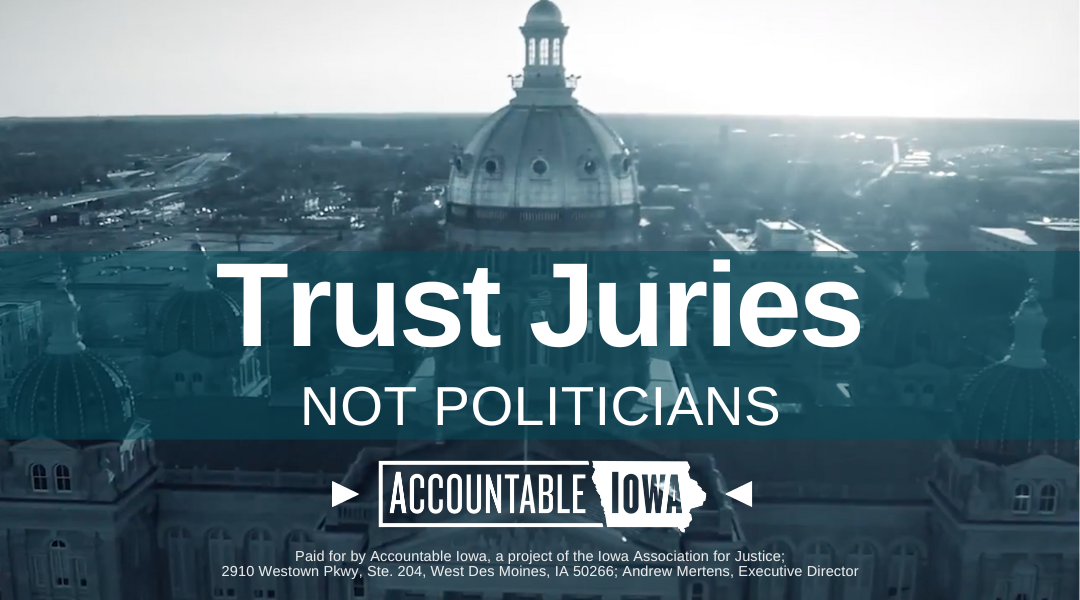This week, I will highlight the important issues that have taken place since my last newsletter two weeks ago, as we complete week 6 in the Iowa House.
Government Oversight Hearing on Sexually Explicit Material in Schools:
The House Government Oversight Committee brought in five Iowa moms to share their experience challenging age-inappropriate books in their child’s school library or curriculum. These moms gave examples of sexually explicit descriptions and images, and shared stories of retaliation by teachers and administrators for voicing their concerns.
Democrats have been dismissive of the material that has been found in some Iowa schools, claiming it is not really an issue. Yet, these materials were so graphic that adults in attendance lowered their heads in embarrassment when the images were depicted and passages read, and a news reporter complained that his live shot was ruined by a parent in the background holding an image from a book that could not legally be shown on television. Given these facts, it is shocking that we even have to argue this point with House Democrats.
Clearly, many of these graphic books do not belong in our schools with children having unlimited access to them. If using the moving rating system, many of these books would be rated R or NC17. This discussion is not about banning books but rather about what is age-appropriate, and what parental notification and consent should be required.
The process to challenge a book is a bureaucratic mess and gives little or no power to parents. One of the moms had to hire a lawyer just to help navigate the one-sided process.
Government Oversight is working to set up another meeting with school administrators so they can share their perspective. I look forward to hearing their comments as we work toward legislation that will protect the innocence of our children and stand up for parental rights that are largely being ignored in some school districts.
Supplemental State Aid (SSA) for K-12 Schools:
In Week 5 the Legislature passed, and the Governor signed, legislation to increase Supplemental State Aid (SSA) funding by 3%. SSA is the amount of funding the state supplies for each student in K-12 schools. Each year the Legislature is required to set this figure for the next fiscal year within 30 days of receiving the Governor’s budget. It is usually the first commitment of taxpayer dollars of the legislative session.
This SSA increase for Fiscal Year 2024 amounts to $106.8 million more than Fiscal Year 2023, for a total of about $3.7 billion in SSA for K-12 schools (over 40% of the overall state budget). It would bring per pupil funding to $7,635 per student, an increase of $222 over FY 2023. Republicans are responsible for record-high education investments over the last decade. K-12 education funding has increased by almost a billion new dollars over the last 10 years. The last time education funding was actually cut was in 2010, when Democrats controlled all three branches of government in Iowa.
As we pass legislation to address the issues of irrational wokeism and disregard for parental rights in some public schools, and give greater choice to parents through Educational Savings Accounts, we remain committed to doing all we can to make our public schools better. We know many of our public schools and most of our teachers are doing their best for their students. Additional legislation is moving to remove some of the administrative burdens placed on schools.
Medical Malpractice (Noneconomic Damages):
The Iowa House passed HF 161, which limits the amount of noneconomic damages that can be awarded for a medical malpractice claim at $2 million if the incident happened at a hospital and $1 million if it happened elsewhere.
In a case of medical malpractice that results in loss of a bodily function, substantial disfigurement, or death, there are three types of damages a jury can award:
- Economic damages – Quantifiable damages like lost wages, loss of future earning capacity, and cost of medical bills. This legislation does not limit what can be awarded to the plaintiff in economic damages.
- Punitive damages – Blatant disregard for the rights or safety of the patient. This legislation does not limit what can be awarded to the plaintiff in punitive damages. This bill mandates that punitive damages are to be awarded to the family, rather than a portion being awarded to the state, as is current law.
- Noneconomic damages – Mental or emotional anguish or other suffering that is very real but cannot be quantified. This bill caps these noneconomic damages at $2 million for hospitals and $1 million elsewhere, adjusted for inflation annually beginning in 2028.
28 other states currently have a hard cap on noneconomic damages or total damages, including all of our surrounding states. Iowa ranks 44th in the nation for physicians per capita, and we are told that part of the problem attracting doctors to Iowa is the issue of malpractice insurance, which is linked to potential jury awards.
No amount of money can ever make up for the loss of a loved one, and I understand the arguments against caps on noneconomic damages. A dollar amount cannot bring back a loved one, but a massive jury award can close down a county hospital, which is a very real possibility in 2023 with no caps on noneconomic damages in place. This has been told to me over and over again by hospital officials in my legislative district. This was a difficult decision for me, but in the end, these concerns are the reason that I supported a hard cap on noneconomic damages.
Gender Identity/Sexual Orientation Curriculum:
This week, the House Education committee passed House File 8. It is now eligible for floor debate by the full House. This legislation prohibits any classroom instruction on gender identity and sexual orientation in K-6th grade. I would like to see this grade even higher, because this is a conversation best left to parents, and instead of simply having a discussion on these topics, the materials I have seen being used in some schools suggest that the objective is not to educate, but rather to indoctrinate and recruit. How else do you explain a poster in a second-grade classroom that proclaims to children that they can choose to be a boy, girl, both, neither or something else, and no one can decide for them?
We send our children to school to learn subjects like reading, writing, math. science and history. This week, a group of legislators, of which I was a part, heard from concerned teachers who came from all parts of the state to tell us they have less and less time to teach these critical subjects; instead, being mandated to spend more and more time on social emotional learning, surveys and gender ideology. This bill would help teachers to use their classroom time on topics that should be taught in school, leaving discussions on social issues more to the parents. Teachers should teach; parents should parent.
In light of the disinformation being spread, it is important to clarify what this legislation does and does not do.
What HF8 Does:
- Prohibits classroom instruction on sexual orientation and gender identity in K-6th grade.
- Prohibits classroom instruction on gender identity or sexual orientation in a manner that is not age appropriate, regardless of grade.
- Allows teachers to stick to curriculum on school subjects like reading, writing, math, science, and history, while leaving the responsibility to discuss social issues where it belongs – with parents.
What HF8 Does NOT Do:
- It does not ban sex education. State guidelines on sex education curriculum remain in code and this bill does not change or affect those guidelines. We are working to more clearly define what should be taught in sex education; it should be about reproductive education not gender identity. We are also considering a requirement that parents must opt their children into sex education classes, as opposed to opting out.
- It does not stop information from being provided to students to prevent sexual abuse. Schools can provide students with necessary information without getting into gender identity and sexual orientation.
- It does not ban books that contain LGBTQ characters. The book discussion relates to what is age appropriate; this argument is a smoke screen by those who do not want to be put in the impossible position of having to justify obscenity and pornography being supplied to children in some of our public schools.
- It does not prevent a teacher in a same sex marriage from talking about or displaying photos of their spouse. This Legislation addresses curriculum.
- It does not prevent students from discussing these topics themselves.
- It does not allow for bullying based on sexual orientation or gender identity. All current bullying policies apply, and instruction on treating others with respect (the Golden Rule) are not impacted.
We have much to do as we prepare to enter Week 7 of the 2023 legislative session. We are approaching the first funnel deadline, a self-imposed requirement that keeps us on track and functional, unlike Washington DC, which continues to drive most of the problems we face as Americans. I am grateful that sanity still reigns in Iowa.

















